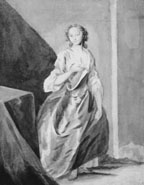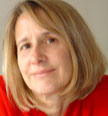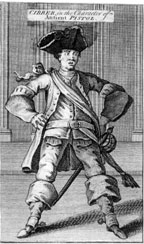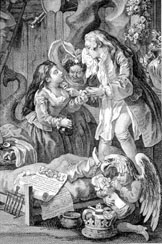|

athryn Shevelow´s biography of actress Charlotte Cibber Charke (1713 - 1760) makes it easy to imagine London's “wild and wicked
theatrical world” at the time when Handel reigned at the Italian Opera, ladies swooned for castrato Farinelli, audiences flocked to The Beggar’s Opera and The Rake’s Progress, rival divas got into fist fights
on-stage, and young satirist Henry Fielding wrote plays that mocked the theatrical establishment at the Royal Theatres Drury Lane and Covent Garden and even provoked the Crown of England.
Shevelow´s vivid descriptions of the scene bring to mind the Boulevard des Crimes in Marcel Carné’s film Les Enfants du Paradis with its
jugglers and acrobats, dancing dogs, beggars and thieves, its elegant women passing in coaches, and its young men of fashion. You just
have to add London's rain and fog to the merry chaos (as illustrated by William Hogarth,) the gambling dens, gin shops and whore houses
right next to the theatres, the stench of human and animal excretions, and the ankle-high mud.
At the center of this continuous performance, we find an eccentric, tragic heroine –  a young, gifted actress who not only specialized in male roles long before Sarah Bernhardt played Hamlet, but who also dressed as a man off
-stage. Her success on-stage and her “ flamboyant adventures” off-stage scandalized her contemporaries and made her a celebrity. Charlotte was the daughter of Colley Cibber,
one of the most “established” and respected actors of the period, and she was – in her own words – the “Nonpareil of the Age.” Later centuries largely reviled her memory until
feminist historians saved the “unnatural” woman from the bias of perversity by discovering her unusually progressive and subversive attitudes. In a pre-pub interview, the
author revealed the sly reason the “well-known troublemaker” turned her on: “It seemed to me that any woman who has been disapproved of
for so long HAS to be interesting.” Charlotte is the first detailed biography of this early “modern” woman -- actress, playwright, director,
manager, mother, wife as well as husband, and “man of all trades.” a young, gifted actress who not only specialized in male roles long before Sarah Bernhardt played Hamlet, but who also dressed as a man off
-stage. Her success on-stage and her “ flamboyant adventures” off-stage scandalized her contemporaries and made her a celebrity. Charlotte was the daughter of Colley Cibber,
one of the most “established” and respected actors of the period, and she was – in her own words – the “Nonpareil of the Age.” Later centuries largely reviled her memory until
feminist historians saved the “unnatural” woman from the bias of perversity by discovering her unusually progressive and subversive attitudes. In a pre-pub interview, the
author revealed the sly reason the “well-known troublemaker” turned her on: “It seemed to me that any woman who has been disapproved of
for so long HAS to be interesting.” Charlotte is the first detailed biography of this early “modern” woman -- actress, playwright, director,
manager, mother, wife as well as husband, and “man of all trades.”
Kathryn Shevelow, a specialist in eighteenth century British literature and culture, is an impressive researcher and excellent writer.  She manages to get the reader through much historical, political, and archival information without being
tedious or didactic. She only sparingly dramatizes or fictionalizes (“Buttoning the upper collar of her greatcoat against the cold drizzle, Charlotte crossed
the muddy carriageway into the square...”). Most of the time, she uses more convincing techniques of speculation (“On James Street, she would have passed the old tennis
court with its shabby upstairs theatre where puppet shows and performances by minor troupes were sometimes held.”) She manages to get the reader through much historical, political, and archival information without being
tedious or didactic. She only sparingly dramatizes or fictionalizes (“Buttoning the upper collar of her greatcoat against the cold drizzle, Charlotte crossed
the muddy carriageway into the square...”). Most of the time, she uses more convincing techniques of speculation (“On James Street, she would have passed the old tennis
court with its shabby upstairs theatre where puppet shows and performances by minor troupes were sometimes held.”)
On the whole, Shevelow sticks to the facts or the absence of facts. Sometimes she voices her own opinion, for example, when she
discusses Charlotte’s “lesbianism” (the term did not yet exist): Charlotte’s longest and most important relationship with an actress only
known as Mrs. Brown. While they shared the life of traveling actresses and lived together, Charlotte passed herself off as Mr. Charles Brown.
“My own judgment,” Shevelow writes, “is that Charlotte and Mrs. Brown were the eighteenth-century forebears of what we would call today a
lesbian couple.” She dares to interpret and admits conjecture when the historical record is obscure, rather than making up stories to fill the gaps.
Charlotte’s story is well enough preserved and recorded in her own writing voice but, at the same time, remains mysterious enough to
leave one touched, troubled, and wondering. She left us one of the first autobiographies written by a woman, and she was the first actress who ever published the story of her life.
And what a story it was. As the daughter of Colley Cibber, one of the most famous comic actors of his time,
Charlotte grew up in the theatre world with its narcissistic display, its self-aggrandizing actors and drama queens. She was the youngest
child of an overpowering father, indulged by a weak, ineffective mother, with older sisters and an admired older brother, Theo/ Theophilus, ( a
family constellation bringing to mind that of a later revolutionary woman: Gertrude Stein and her brother Leo.) As a little girl, Charlotte donned
her father’s clothes, grabbed his sword, and with his huge wig almost reaching her feet, promenaded for the amused villagers. This early
desire to be like her father, her first public success of cross-dressing, seems to have stamped her life.
In her youth, she preferred guns and horses to dresses, and as soon as she entered the stage, she grabbed any breeches part she could
get. But she did not only play the type of Shakespearean heroine who disguises herself as a man in order to pursue or test or find a husband.
She played men – “travesty parts” as opposed to “breeches parts” –, like Roderigo in Shakespeare's Othello, Macheath in John Gay’s The Beggar's Opera, the libertine Lotario in The Fair Penitent, the tragic
hero in The London Merchant, or Sir Charles in The Beaux’ Stratagem. Her strongest suit was parodying male attitudes in comedies or
burlesque plays. She apparently had a knack for making fun of the men she embodied – among them her brother Theo in his best comic roles.
Throwing herself into an impetuous marriage at seventeen and ending up with a daughter did not change her obsession with male
impersonating. “If Charlotte, tall and slender, had not looked dashing in men’s clothes, “ Shevelow writes, “London’s notoriously picky audiences would not have accepted her in so many breeches parts.
Probably few, if any, actresses could wear breeches as convincingly, or move in them as confidently, as she. (...) And there must have been spectators of both sexes susceptible to the pleasures of sexual
ambiguity... The cross-dresser’s status as simultaneously ‘both-and’ and ‘neither-nor’ must have delivered, for some, its own erotic charge.” If just “for some,” then certainly for Charlotte herself.
She was barely twenty when she altogether stopped wearing female clothes. The bawds and prostitutes of Covent Garden whom she
befriended while chasing after her dissolute husband in gambling dens and brothels, affectionately called her “Sir Charles. ” Her conventional
father was enraged by this degree of indecency in his “unnatural” daughter. Her sisters were scandalized. Cibber threatened to disown
her if she didn't return to proper female behavior. Charlotte admitted in her memoir that she engaged in “Follies”, “Faults,” and “private
Misconduct” and that she was “too conspicuous.” Shevelow comments: “Tantalizingly, she did not specify what this private but conspicuous misconduct consisted of...” and goes on to speculate that Charlotte
may have had relationships with women; and that she “may have embraced the London low life that surrounded her (...), roaming the London streets by night, as she would do later, ‘in search of Adventure
.’ ”
Stubborn, grandiose and hot-headed like the men in her family, Charlotte (quite unrealistically) refused to believe in her father’s
threats. He had always helped her, and wasn't she entitled to his benevolence, just as she was entitled to act at the place of his glory,
the Royal Theatre? But in the same year of the rift with her father, she was fired from “Ancient Drury,” as she nostalgically called it. Over night,
she was destitute. Whatever money she had earned was legally owned ( and spent) by her husband. She alone had the charge of her
daughter. No wonder she saw herself as Cordelia, betrayed by her vicious sisters, who had goaded the king to disown the one who truly loved him...
But instead of taking on the role of the obedient daughter, Charlotte went on the attack. She assumed another set of male roles. She
became one of the first female director-managers, creating her own company, The Mad Company. She also turned playwright and successfully dramatized (and played) her own acts of revenge against
the insults she had suffered from both her family and the theatre establishment.
Her very public rebellion opened her the doors to The Little Haymarket, the stage of her father's worst enemy, Henry Fielding. Cibber had
already been a fiercely embattled theatre manager, director and playwright. His enemies resented his grandiosity and despised him as
a sycophant at the royal court. But his elevation to Poet Laureate had catapulted him to the height of ridicule as he was a mediocre poet ..
.who used to edit and rewrite Shakespeare’s plays. Alexander Pope gave him a place of honor among the population of dunces in his Dunciade. Now Fielding directed scandalous Charlotte in the signature
roles of her father – the roles of the arrogant fop who makes a fool of himself. Paradoxically, Charlotte seems to have had no awareness that
Colley Cibber would have feelings about his daughter making fun of him in this way. She again refused to give in to him and leave Fielding’s company. Instead, she became the talk of London playing “Lord
Foppington” ( from her father’s comedy The Careless Husband). Henry Fielding had made Charlotte a star.
 
Shevelow relishes the theatre feuds and rivalries, battles of playwrights, duels of actors and their mutinies against the management. She
vividly evokes the political crisis brought to a head by Fielding’s ever more politically provocative plays (with Charlotte his leading man.) At the zenith of their success, the government stepped in.
The Stage Licensing Act was passed by the House of Commons and the House of Lords, in 1737, and within a few days, the King gave his
assent. The new law shut down all the playhouses not licensed or operated by virtue of a royal patent, which meant that only three
theatres were left to London – the Theatres Royal Drury Lane and Covent Garden, and the King’s Theatre in the Haymarket. Performing without a license now was a criminal offense. Any new plays or
additions to old plays were subject to the lord chamberlain’s censorship. Shevelow writes: “The act effectively stifled the development of theatre
in London for centuries. (A version of its censorship provision remained in force until 1968.)”
The general devastation of the theatre landscape brought an end to Fielding’s theatrical career. But whereas he developed into one of Britain's most famous novelists ( Tom Jones), Charlotte spent the next
23 years of her life as an outcast.
The last third of Charlotte is the account of her struggle to survive with her daughter, without any help from her rich father. It is an increasingly
suspenseful story as Charlotte comes up with one brilliant or hare-brained scheme after another to get around the law or defy the law in
order to pursue her passion for the theatre. When everything fails, she throws herself into a new enterprise (and new “role”) as a baker,
sausage-maker, oil-seller, runs a steak- and soup house and – most risqué – manservant for a libertine nobleman.
Charlotte must have been a generous, extremely charismatic and seductive person as she always found friends, supporters and last
-minute saviors who kept her out of the clutches of debtor’s prison and invested in her next brazen scheme. The identity of one of her most
important benefactors, who almost saved her, remains a mystery, and Shevelow wonders why Charlotte never revealed who he was. I wonder
if this generous man was a woman, a courtesan, for example, who had to remain under a veil -- like the earlier “Follies” Carlotte preferred
to keep secret. For years, she endured the hardship of itinerant players, “strolling actors,” in the poor, backward provinces of England. Partly
due to bad luck, partly to her lack of a sense of reality in managing her money and her energy, Charlotte was often one step away from famine,
arrest for illegally performing , illness and death from exhaustion.
She had one major reprieve from misery, however, when she once again followed in the footsteps of her father and brother and published her memoir, A Narrative of the Life of Mrs. Charlotte Charke, Youngest
Daughter of Colley Cibber, Esq, Written by herself at age forty-two. The witty, unsentimental story of her life was an instant success. Its
personal tragedy, however, resided in the fact that it was written as the confession of a repentant daughter pleading for forgiveness, eternally
hopeful that her book would soften her father’s heart. Unfortunately, Charlotte was still more at home in the world of theatrical fiction than in reality.
Shevelow ends the Prologue of her fascinating book: “To us today, Charlotte appears particularly modern as an individual who rejected a
fixed definition of her sexuality and her gender, testing the permeability of the cultural line that supposedly separates women from men. (...)
Charlotte saw herself both as the heroine of a tragicomedy and as a spectacle. ‘If Oddity can plead any Right to Surprise and Astonishment,’
she said, with her characteristic mixture of self-deprecating humor and pride, ‘I may positively claim a Title to be shewn among the Wonders of Ages past, and those to come.’”
Charlotte, by Kathryn Shevelow (Henry Holt, 2005)
|